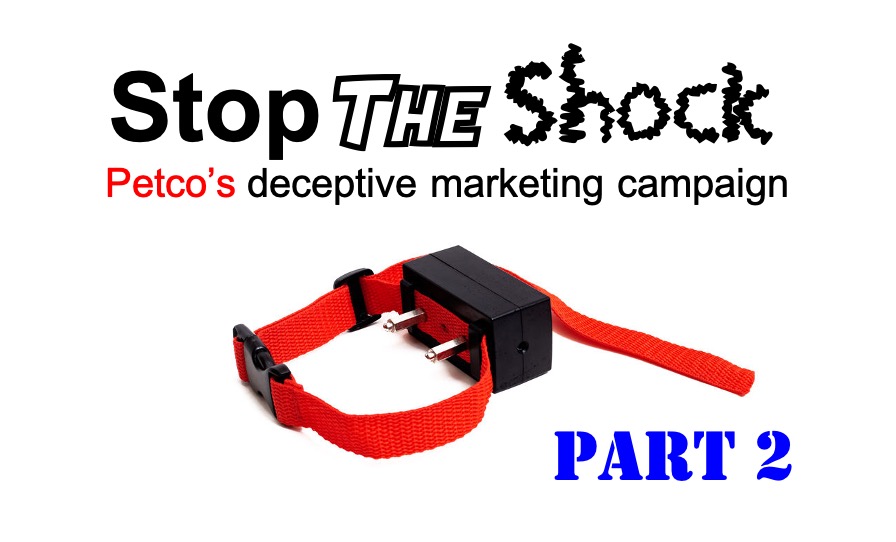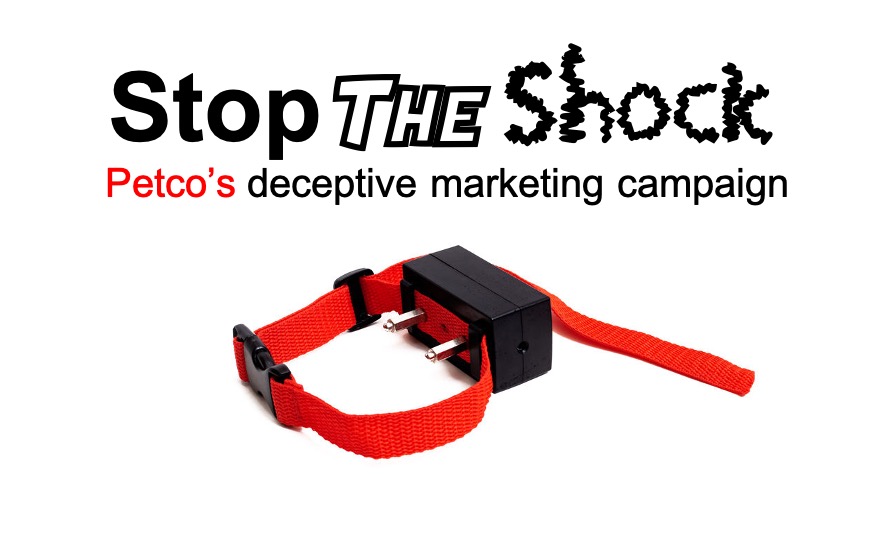Canine News You Can Use
Stop the Shock: Petco’s Deceptive Marketing Campaign (Part 2)

In Part 1 we reviewed the misleading message of Petco’s CEO, Ron Coughlin, but that is not the end of the story. Rather than merely taking a position to remove electronic collars from their product offering, they are actively involved in getting others to get with the program. This has been done through an on-line petition. So, let’s take a look at the content of the petition.
TITLE OF PETITION: “Help Petco #StoptheShock. Join Our Movement to Create Responsible Guidelines for Shock Collars”
Right out of the box they have created a confusing and contradictory title for the petition: Is it “StoptheShock” or “Create Responsible Guidelines?” These are two very different goals.
“We know the use of shock collars can be a divisive topic, but shock collars have been shown to increase fear, anxiety and stress levels in dogs. In contrast, studies have shown that dogs respond effectively to positive, voluntary and rewards-based training. We also believe the opportunity for human error and misuse of certain shock collars — even by well-meaning pet parents — is simply too high.”
Within this paragraph, Petco repeats some of the information from the CEO’s letter. In part 1, I provided examples of three trainers, complete with videos, that debunk the blanket statement that “shock collars have been shown to increase fear, anxiety and stress levels in dogs.” Whenever the phrase, “studies have shown” is used without citing any study, it should not be taken on face value. If you have ever read one of these studies, they are usually full of qualifiers like “might,” “may,” “could,” and “possibly” In addition, more likely than not there will be other studies that do not come to the same conclusions.
“Human error and misuse” – This is true for any dog training tool, or any tool for that matter. Should we ban the use of ladders, or start a petition to create guidelines for the proper use of ladders? (see photo below) About 500,000 people are injured annually with some 300 fatalities as referenced in Industrial Safety and Hygiene News. Electronic collars come with instructions, and there is plenty of content available on the internet for those who want to learn proper usage.

“Certain shock collars” - Why are only some types of electronic collars the culprits? They all deliver the same type of sensation at varying levels. This would seem to indicate that the elimination of “hand-held” electronic devices and anti-bark collars could be swapped out with Petco’s training classes and purchasing their treats. The same is not true with pet containment systems, so those (a) will continue to be sold by Petco, and (b) somehow do not cause fear, anxiety, and stress. The reasoning does not make sense.
“We're also calling on the rest of the pet industry, pet parents and anyone who loves pets to help us create new guidelines, engage in responsible self-regulation and consider legislative change for the retail sale of certain shock collars to general consumers.”
“…engage in responsible self-regulation…” - This would imply that self-regulation is nonexistent. The International Association of Canine Professionals (IACP), of which I am a member, takes the proper usage of all dog training tools and the welfare of dogs very seriously. As an example, this video is on the Public Education Portal of the IACP web site:
This video clearly demonstrates that professional organizations such as IACP and manufacturers like Garmin are concerned about the proper use of this tool.
“…consider legislative change…” - Legislative change should be based on facts, not emotion (which is why they use the term, “pet parents”). The entire Petco petition campaign is designed to play on the emotion of a consumer. Although I do not know the details of each person’s experience, my guess would be the following comments (entered on the petition) come from people who do not know anything about electronic collars and are getting most, if not all of their information from Petco and possibly other anti-electronic collar sources.
Francine L., California: “I have seen too many domestic animals being abused in various ways. Humanity is the voice of these precious creatures.”
Debbie M., New Hampshire: “Kindness and not damaging relationship. It’s cruel.”
Joy W., Illinois: “Because I have dogs and I know how sensitive they are, and how trainable if you put in the effort instead of shocking them.”
Tracy L., Pennsylvania: “Teach your pets good behavior the same way you teach your children good behavior. End Abuse to innocent animals. My Best friends all have fur.”
“This is a complex problem, but together we would like to see: Other retailers and manufacturers join us in either not selling or applying responsible guidelines and restrictions to the retail sale of specific shock collars to general consumers — except in a professional capacity or in partnership with and/or under the guidance of a certified dog trainer”
Petco appears to be saying to other retailers and manufacturers, “We are taking the moral high ground on this issue, so you should, too. Change your business model to align with ours." As stated previously, responsible guidelines are already available for those who are truly interested in educating themselves.
“…except in a professional capacity or in partnership with and/or under the guidance of a certified dog trainer” - I am not really clear on what “except in a professional capacity” means. Maybe they should only be sold to professional dog trainers? If so, who defines the requirements for a professional dog trainer? And “certified dog trainer” opens up an entirely new problem – certified by whom? There are many certifications available, with some gained through a test only and others through actually training dogs and submitting documentation (and in some cases, videos). For more information, check out this blog on certifications: What is a certified dog trainer, and do I need one?
“More access to, awareness of and education around positive reinforcement training”
“More pet parents choosing positive reinforcement training instead of aversive or punishment-based training”
Again, the results of these statements would be self-serving for Petco. And as covered previously, positive reinforcement cannot, by definition, stop an unwanted behavior. “Punishment based training” is non-existent in my world of dog training, which includes colleagues from across the world. But it all sounds good from a Petco marketing perspective and is intended to stir the emotions of an uninformed consumer.
“At Petco, we're taking the first step to #StoptheShock but we can improve the lives of even more pets if we work together. Sign our petition today and join our movement for responsible guidelines on the sale of shock collars nationwide.”
Is Petco really leading the charge to “improve the lives of even more pets if we work together?”Are they being honest when they are calling on manufacturers and other retailers to join the cause? Have they contacted retailers like Petsmart, Gun Dog Supply, Leerburg, Amazon, and Bass Pro Shops, or manufacturers like Garmin, E-Collar Technologies, SportDog, or Dogtra? If they were serious about “working together,” they would (or should) state that other companies have been contacted. But it seems that they are using the consumer (via petition) to affect the change they desire. Remember the part about “legislative change?” The changes they desire would be by force, not by cooperation.
My view of Petco as a pet supply store and training organization was neutral up to October 6, 2020. In fact, I have had a Petco P.A.L.S. card for many years. As a professional dog trainer, however, the deception of Petco’s “StoptheShock” cannot be overlooked. Had they simply stopped selling electronic training collars because it did not align with their philosophy, my P.A.L.S. card would stay in my wallet. But they made this a national protest instead of a Petco policy change, so other voices need to be heard. You have heard mine, so I will end here.
Do you have comments or questions? Let us know on Facebook: Stop the Shock: Petco’s Deceptive Marketing Campaign (Part 2)
Did you miss Part 1? Read it here: Stop the Shock: Petco’s Deceptive Marketing Campaign (Part 1)
Automatically get notified of our blog updates and other stuff by signing up here: Subscribe Now (as a special bonus, you will also receive access to the “Wait Command Video” and a downloadable poster)
Breaking Through Barriers, Transforming Lives...
Jeff

Stop the Shock: Petco’s Deceptive Marketing Campaign (Part 1)
On October 6, 2020, Petco decided to make changes to the products they sell, eliminating the sale of electronic collars (e-collar) “operated by a person with a remote in hand.” This was a major marketing campaign designed to position Petco as a Health and Wellness organization for pets. Unfortunately, the campaign included much misinformation related to the use of e-collars. Blue Bridge Dog Training advocates for the proper use of e-collars, but we must

What is off-leash control and why is it important?
So, what is off-leash control and why is it important? Here’s how I define off-leash control:

The CBD Craze: What’s it all about?
Last September, I attended the annual International Association of Canine Professionals (IACP) conference in Colorado Springs.

Kora, Dilated Cardiomyopathy, and Farewell
On Wednesday, April 3, 2019, Kora had decided to go into her crate on her own for the evening, which was earlier than usual. It was about 8:00pm, and previously we would tell her "Bed Time," usually between 9:30-10:00pm. That was the last time we would see her alive

5 Things You Should Know About Positive Reinforcement
Most likely you have heard of the term “positive reinforcement.” In some cases, it is used only as marketing jargon, and in many cases, it brings “give your dog a treat” to mind. In training your dog, though, it should have a clear and consistent meaning. Let’s take a look…

Do you punish your dog? If so, how? If not, why not?
If your dog has absolutely no behavior problems, read no further. This article will be of little interest to you. But if your dog jumps on people, barks, growls, bolts out of an open door, steals food off of a counter, paws at you, etc., etc., read on. There may be some valuable information for you here.

Be Prepared… It’s not just for Boy Scouts
The #1 Golden Rule at Blue Bridge Dog Training is “You are your dog’s protector,” against other dogs, against people, against cars, against cold and heat, and whatever else might harm your dog. This is a big responsibility for us and for any...

Doggie wasteland… Do you need a sign like this in your yard?
“Doggie wasteland, it’s only doggie wasteland…” OK, so I took a little creative license from a 1970’s song (Baba O’Riley) by a rock band named The Who. Now that you may have the melody stuck in your head with my new lyrics, let’s talk about...

Oh No! A Dog Food Recall!
If you are old enough, you might remember the TV show "Lost In Space." There was a robot on the show that would warn the space travelers of dangerous situations that crossed their path (like that scary looking fellow in the photo). We do not get a robot warning, but we might find out that the dog food we purchase has a problem. And even the best dog food manufacturers can find themselves having to issue a recall notice.
